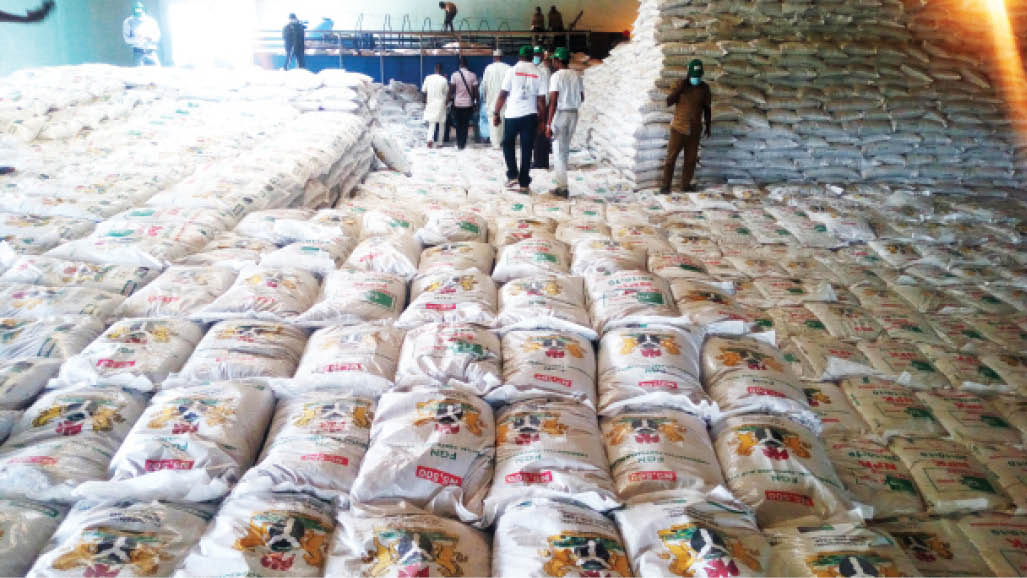Farmers, particularly small-scale ones, in the country have decried the high cost of fertiliser in most rural communities.
The high cost of the key farm input, our correspondents learnt, has also weakened the sales of the commodity in some states.
- 13 die, 12 injured in Lagos-Ibadan Highway crash
- What is Pegasus spyware and how does it hack phones?
Depending on brand and location, Daily Trust reports that the NPK fertiliser is sold between N14,000 and N15,000 per 50kg bag, while urea is sold between N11,500 and N12,000.
This is against the federal government’s susidised ones, which were sold at between N5,000 and N5,500 last year through the Presidential Fertiliser Initiative (PFI).
This year, PFI seems to have failed to deliver on its mandate as farmers say the subsidised fertilisers were not in the market, thereby making access to them difficult for rural and other small-scale farmers across the country.
To worsen the situation, the Minister of Agriculture and Rural Development, Alhaji Mohammed Sabo Nanono, earlier said the ministry would hands off from the issue of fertiliser.
He told our Agric Editor that it would be of good interest to allow states and market forces to determine the availability of fertiliser, while the ministry would continue to monitor and supervise the system.
However, the National President of All Farmers Association of Nigeria (AFAN), Arc Kabiru Ibrahim, warned that if the situation was not quickly addressed there might be acute shortage of food in the nearest future.
Arc Ibrahim said, “In the last five years, we enjoyed PFI. Through the initiative, the NPK 20:10:10 was sold at N5,500, and last year N5,000 due to the COVID-19 pandemic, but this year we are left with buying directly from the fertiliser companies at N9,500, excluding transportation. How do you want the small-scale farmers to cope with this at the open market.”
He further said rural farmers were suffering more because in some cases the price of the input went up as a result of transportation fare.
‘No much impact from Dangote fertilizer’
The farmers’ hope that the entrance into the market of Dangote fertiliser would crash the price of the input and make it more accessible seems not to be visible.
This is because the farmers said the differences in price were not much.
Our correspondent in Kano reports that a 50kg bag of Dangote fertiliser costs N11,500, while that of Notore goes for between N13,000 and N13,500. Indorama brand sells at between N12,000 and N12,500.
Apart from the price, Mallam Mohammed Isah, a farmer in Niger State, said Dangote only produced urea while farmers mostly used NPK.
However, Arc Ibrahim said the impact from Dangote fertiliser would not be immediate, adding that as time go by, the market would be saturated and the price would crash naturally.
Bauchi, FCT, others worst hit
Farmers in area councils of the Federal Capital Territory (FCT) have decried the high cost of fertiliser, saying the situation may affect crop output this year.
Mr John Madaki, a farmer in Kuje Area Council, said he bought a bag of NPK at 14, 800 as against N5,000 they bought the federal governments subsidised one last year.
Similarly, Mrs Alice Gabayi from Bwari Area Council said many of the female farmers could not afford fertiliser this year because of the price, adding that six of them had to contribute money to get a bag last week at N14,600.
Reports from Bauchi indicate that the high cost of fertiliser has become a nightmare to farmers in the state.
Alhaji Saidu Abubakar, a farmer, said, “A bag of NPK is sold at N14,500 and urea at N11,500.
He said even the state government-subsidised ones were also costly as the difference was only N500, adding that even at that they were not available.
Another farmer in Alkaleri LGA, Usman Ali Dunduma, said the high cost of fertiliser, inconsistent rainfall, coupled with austere economic conditions had put many small-scale farmers in a dilemma.
He said, “We just started planting our crops last week due to the inconsistent rainfall, and the major hurdle now is the high cost of fertiliser in the market.’’
The Bauchi State Coordinator of Small Scale Women Farmers Association of Nigeria (SWOFAN), Marka Abba, said the high cost of fertiliser had become a source of concern for farmers, especially small-scale ones.
She said, “We just concluded a meeting over the issue. A good number of small-scale farmers have not planted their crops due to the high cost of fertiliser and fear of the unknown after harvest.’’
The Bauchi State Chairman of AFAN, Barr Yakubu Abdullahi, said farmers had no option than to go to the open market to buy fertiliser because the government’s ones were not available.
He said, “We don’t know the reason why after the flag off of the sales of state-government subsidised fertiliser, the ministry suspended the sales.”
However, the governor of Bauchi State, Bala Mohammed, said his government had procured 100 trailers of fertiliser at over N120m which was to be sold directly to the farmers.
The governor who spoke at the launching of the 2021 farming season a fortnight ago at Soro town in Ganjuwa LGA, directed the state fertiliser blending company to sell the commodity, which was subsidised by N500 per bag directly to the farmers.
A source in the state’s Ministry of Agriculture said the ministry would on Saturday flag off the state government’s subsidised farming inputs, including fertiliser, improved seeds and pesticides.
Dealers lament low patronage
Traders selling fertiliser are complaining of low patronage as farmers’ purchasing ability has declined.
This, some of the traders, attributed to the bad economy and the high cost of fertiliser this year.
At the Muda Lawal Market in Bauchi, Ahmed Idris confirmed the poor sales of fertiliser, saying, “Sometimes we spend the whole day without selling a bag of fertiliser due to low patronage. What we sell fast now are pesticides and herbicides.’’
There are similar reports from Ibadan, Ilorin and Benin as traders complain of low patronage.

 Join Daily Trust WhatsApp Community For Quick Access To News and Happenings Around You.
Join Daily Trust WhatsApp Community For Quick Access To News and Happenings Around You.


